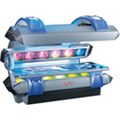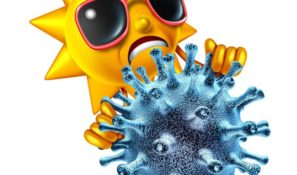And the link between melanoma and sun exposure is not straightforward. Dr. Marianne Berwick, an epidemiologist at the University of New Mexico who studies skin cancer, led a study published in The Journal of the National Cancer Institute in 2005 finding that people who had a lot of sun exposure up to the time they got a diagnosis of melanoma actually had better survival rates than those who had little sun exposure. The researchers are conducting a large-scale follow-up aimed at clarifying the relationship between sun exposure and melanoma.
Until that is made clear, many doctors say, it is premature to suggest that people are endangering their lives by failing to use sunscreen.
“It’s just not that simple,” said Dr. Barry Kramer, associate director for disease prevention at the National Institutes of Health.
“We do have some pretty good evidence that sunscreen will reduce your risk of the less lethal forms of skin cancer,” Dr. Kramer added. “There’s very little evidence that sunscreens protect you against melanoma, yet you often hear that as the dominant message.”
Dr. J. Leonard Lichtenfeld, deputy chief medical officer at the American Cancer Society, acknowledges that the advertisement is aggressive. “We have taken some license in taking that message and using it the way we’ve used it,” he said, “because that’s the way to get the message to our target audience.”
Dr. Lichtenfeld said the advertisements were aimed at women ages 20 to 48 because sun exposure in childhood and young adulthood can influence skin cancer risk later in life, and it is mothers who largely control children’s time in the sun.
He added that the advertisement’s creators settled on the approach with the help of focus groups, who told them, “To get the message through to me, you have to shock me and get my attention.”
“Our focus groups showed us that these young women as a group were oblivious to the risk and felt that skin cancer isn’t a serious problem,” Dr. Lichtenfeld said, adding, “The issue isn’t ‘How can you tell whether it was caused by sun exposure?’ The issue is to try and prevent that sun exposure earlier in life so we reduce the risk for people later in life.”
In an effort to spread awareness about sun safety, the cancer society has joined with Neutrogena, a division of Johnson & Johnson whose sunscreens carry the society’s logo.
As part of the agreement, Neutrogena is paying for the public-service campaign, though its name is not mentioned in the advertisement.
Iris Grossman, director of communications for Johnson & Johnson, said the partnership benefited both parties. “We have the common goal of raising awareness of the importance of sun protection,” she said.
But this financial relationship raises red flags for some experts. “When people see an American Cancer Society public service announcement,” said Dr. Lisa Schwartz, co-director of the Outcomes Group at the Veterans Affairs hospital in White River Junction, Vt., “they expect it to reflect the best evidence. We don’t want people who have a financial interest to be telling you the benefit of doing something.” Dr. Lichtenfeld replied that Neutrogena did not influence the cancer society’s message on skin cancer.
The subject “has been important to our organization for some time,” he said, adding that the announcements “don’t promote something with a Neutrogena message on it — it’s our message.”
Howard L. Kaufman, co-director of the Melanoma Center at Columbia University and author of “The Melanoma Book” (Gotham, 2005), estimates that only 20 percent of melanomas are related to sun exposure, but says, “It’s the one risk factor that we can control.” While he calls the advertisements “a little bit alarmist” he says they are meant to raise awareness and they achieve that goal.
But Dr. Kramer, of the National Institutes of Health, disputes the advertisement’s assertion that skin cancer is “almost always curable if you catch it early.”
“There’s no high-quality evidence,” he said, “that shows that skin cancer screening prevents deaths.”
While the notion that detecting and treating early-stage cancers can prevent deaths might seem logical, the idea represents a gross oversimplification of how cancer works, Dr. Kramer said.
Cancers follow three basic patterns, he went on: turtles, birds and bears. “Turtles move so slowly that you can still capture them while they’re moving slowly along; the birds fly away so quickly that you can’t catch them in time; and the bears can escape if you ignore them, but if you catch them in time, you can capture them,” he said.
Cancer screening aims to catch the bears so they can be removed before they metastasize. Detecting turtles does not save lives, because these cancers were never destined to kill, and birds simply cannot be seen until it is too late. The problem is that doctors cannot tell which pattern an individual cancer will follow.
The incidence of melanoma has risen sharply in the past few decades, as skin cancer screening has become more common, and early stage cancers account for the increase in cases, Dr. Kramer said. If these new cancers were bears, “You’d expect late-stage to disappear or drop off, and that hasn’t happened,” he said. “For all the increase in diagnosis at early stage, we haven’t changed the risk of dying. We’re curing people who didn’t need to be cured in the first place.”
These unnecessary cures come with a price, said Dr. H. Gilbert Welch, Dr. Schwartz’s colleague at the Veterans Affairs Medical Center and author of “Should I Be Tested for Cancer?” (University of California Press, 2004). Not only do people end up with surgeries and treatments that can be harmful, he continued, but “they get caught in a cycle of constant surveillance, and they can’t get health insurance.”
Dr. Schwartz says getting a sunburn should not be a cause for panic.
“You’re taking a small risk and raising it somewhat,” she said, “but it’s still a small risk.”
She added that the cancer society needed to trust consumers to understand the complexities of skin cancer and to make their own decisions about how to protect themselves and their children.
“People make good decisions in their life all the time,” she said.















